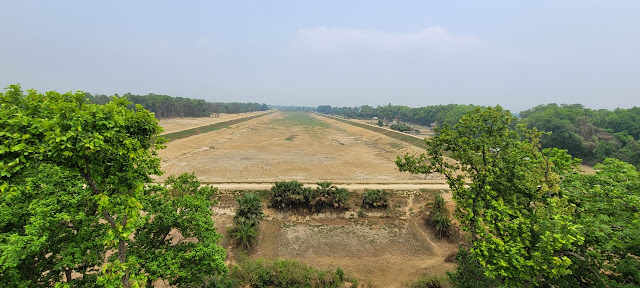Adibashi Loko Utsab in Rajshahi
Highlighting cultural diversity and harmony
Indigenous cultural diversity in Bangladesh was celebrated with music, dance, photo exhibition and discussion at the Adibashi Loko Utsab held recently in Rajshahi. The aim was to encourage harmony by incorporating their language and ethnic identity.
The three-day event, jointly organised by Jatiyo Adibashi Parishad and Ashtha, was held at Bhubon Mohon Park, Rajshahi with the slogan 'Amader bhasha o porichoye jago Bangladesh'. Renowned litterateur Hassan Azizul Haque inaugurated the festival while advocate Sultana Kamal attended as chief guest. Anil Marandi of Jatiyo Adibashi Parishad presided over the programme.
Participants from different ethnic groups -- Santal, Oraon, Munda, Mahali, Mandi, Rajbangshi, Rajoar, Bhuimali -- from Dinajpur, Naogaon, Natore, Chapainawabganj, Rajshahi, Bogra and Gazipur, and representatives of civil society and mass media took part in the celebration and showed support for the solidarity. Bengalis, the majority, also joined the utsab. "We have to embrace diversity and come together as one" -- was the theme of the festival.
According to Rabindranath Soren, general secretary of Jatiyo Adibashi Parishad, the festival was a point of convergence to share their strong, proud and lasting culture with the wider community. "The festival will contribute to enhance cultural self-expression and interaction. Hopefully it will also bridge the cultural gap between people of different ethnic identities in the country," he said. The festival further called for constitutional recognition of their ethnic identities.
Performers at the festival represented both traditional and modern aspects of indigenous cultures. Traditional dong dance and music, karam dance, dasai dance and jhumur (also called jhumer) dance performance along with modern songs and theatrical performance were attempts to identify and showcase the heritage as well as the significant shift that has been going on within indigenous cultures.
Five-discussion sessions titled 'Whose Language? Whose Culture?? Whose State???' 'Globalisation vs Freedom', 'Indigenous Peoples' Art, Literature and National Conscience', 'Contribution of Indigenous people in the Liberation War' and 'Water-Forest-Land Rights of the Indigenous Peoples in Bangladesh' were held during the festival. Pavel Partha, A K M Masud Ali, Sharmeen Murshid, Ayub Hossain and Professor Saidur Rahman Khan presented the keynote papers respectively.
Mrittika, a magazine on issues regarding indigenous communities arranged a photo exhibition titled Bolshal Bringni Mandirang (Mandis of sal forest) highlighting the culture, lifestyle and struggles of Mandis in Madhupur, Tangail.
The festival ended with a colourful rally.


Comments
Post a Comment